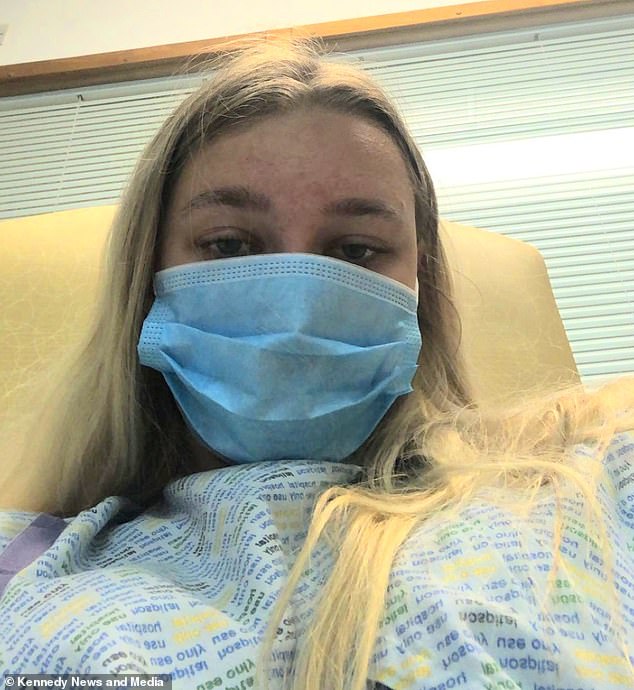Real estate agent, 22, claims she almost died from six blood clots after a nurse blamed her leg pain on her being a ‘lazy student who stayed in bed too long’
An estate agent has claimed she could have died after being told her leg pain was due to her being a ‘lazy student’.
Maela Penney, from Liskeard in Cornwall, made an urgent appointment with her GP in October 2019.
But the 22-year-old was sent home with painkillers by a nurse who told her she had been ‘in bed too long’, she claimed.
When her symptoms worsened, Ms Penney had to return to the same practice in a wheelchair just 24 hours later.
It was only during the second appointment that the nurse practitioner diagnosed her with deep vein thrombosis (DVT) and advised her to go to the emergency room.
Maela Penney (pictured), from Liskeard in Cornwall, made an urgent appointment with her GP in October 2019. But the 22-year-old was sent home with painkillers by a nurse who told her she had been “in bed too long.” ‘ she claimed

After attending A&E, Ms Penney was also given blood-thinning injections before being taken to theater where her clots were removed. Days later, she underwent a second operation to have a stent placed in her leg. Pictured during her stay in hospital
The painful condition occurs when a clot forms in a vein, usually in the leg.
It can be life-threatening if a part breaks off and blocks blood flow to the lungs, medically known as pulmonary embolism.
Scans done in hospital the next day showed she had six clots, some of which were the ‘size of a 50p coin’.
Recalling her ordeal, Mrs Penney said: ‘I started having bad hip pain.
‘It hurt and kept me awake at night. I didn’t think it was anything serious at the time.
‘I called my doctors in the morning and explained that I was in pain.
‘At this point I couldn’t walk very well, but I could still walk. My grandfather came with me and helped me walk to the doctors.
‘When I got there, I was seen by a nurse. She asked if I was an active person and at that time I wasn’t really doing much because I was studying.
‘She said that if you spend a lot of time in bed, your muscles can seize up. She actually said I was a lazy student who didn’t get enough exercise and stayed in bed too long.’
After attending A&E, Ms Penney was also given blood-thinning injections before being taken to theater where her clots were removed.
Days later, she underwent a second operation to have a stent placed in her leg.
These expand against blocked or narrowed artery walls and act as a scaffold to keep the veins open.
Mrs Penney was also prescribed blood-thinning tablets to take for the rest of her life to reduce the risk of further clots.
She added: “I probably would have been dead if I hadn’t pushed for it. I had a scan before all the clots were removed and the clots all led to the main artery in my heart.
“It was only a matter of time, it could have had a bad outcome if I had just stayed home.”
DVT symptoms include redness, aching, severe pain, and sometimes swelling, usually in the calf or thigh.
In severe cases, chest pain, difficulty breathing, a faster heart rate, and coughing up blood can be signs of a pulmonary embolism.
Research shows that 40 percent of patients who die from a pulmonary embolism complained of nagging symptoms weeks before their death.
For every pulmonary embolism diagnosed in time, there are at least two cases where the diagnosis was missed and led to sudden death, according to the charity Thrombosis UK.
Also in England, the number of deaths from blood clots has risen from 12,457 per year in 2019/20 to 14,846 in 2021/2022.
Ms Penney said she has now “lost confidence” in medical professionals and urged people to get a second opinion if they “know something is wrong”.
She added: ‘I’m disappointed the nurse didn’t spot the signs because looking back on it now it’s clear what the problem was.
“After that happened, I feel like I lost trust in medical professionals. If I can avoid going to the doctor, I will.
“If something isn’t right, I wouldn’t accept that as an answer if you’re not happy. I would ask for a second opinion and keep pushing, because you know when something is wrong.
‘Don’t just accept the first answer if you’re not satisfied. I knew something was wrong. In these situations you have to be persistent, especially if it is going to save your life.”
